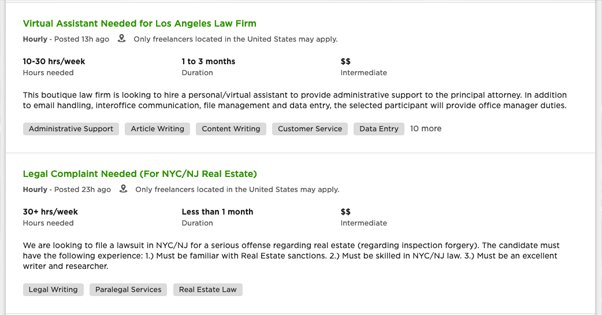In general, guest blogging is a great way to build momentum for any site. You get some traffic, you get a link, you get some name recognition, and on and on. The benefits are numerous, and I’ve certainly covered them before.
One thing I’ve also covered before is the differences between industries and niches. If you’re familiar with my writing, I guarantee you’ve read the phrase “what works for one business might not work for another.” What works for me isn’t guaranteed to work for you, and might work even better for someone else. One key element to any online marketing is tailoring your marketing efforts to the niche, the brand, and the circumstance in which you’re operating.
So let’s consider the niche of legal work. A law office is a very specific, regulated kind of work. Lawyers need to progress through years of hard schooling and learn the ins and outs of a frankly labyrinthine framework upon which society is based. Lawyers specialize, even within the field of law, to practice different kinds of law. The knowledge base of a copyright attorney is not he same as a criminal prosecutor, which is not the same as a corporate lawyer.
Part of finding success as a lawyer is attracting the right kind of clients. A lawyer specializing in copyright isn’t going to succeed if the only clients that find them are focused on medical law.
This is where the web comes in handy. Creating a website can allow possible clients to find your law practice, and allows them to check to make sure you cover the right kind of law so they don’t waste their and your time with a consultation.
Of course, in order to be found on the web these days, you need a blog. The way Google works – and most people use Google, so they determine the way the wind blows – you need a certain volume of content and a certain level of continuing content in order to show up. How much depends, of course, on the competition in your niche.
Guest posting adds to this. When you reach out and post on other sites, you showcase your expertise, you build SEO momentum to your website, and you make yourself easier to find online.
Determining if Guest Posting is Right for You
You know all about the potential benefits you can get from guest blogging, so now you need to weigh them against the drawbacks. There’s value to be found, but is that value, well, valuable? Here are some considerations you might have.
Can you handle an increase in workload? Remember that the end goal for guest blogging is to bring in more viewers, which, when you’re operating a specialized law firm website, usually means more clients. If you’re not prepared to take on more clients, or at least refer them to someone else who is, you might want to hold off on attempting a growth strategy. On the other hand, if you’re in a position where you can scale easily and take on more and more work, embarking on a guest posting strategy might be just the thing you need to kick it into high gear.
Are there sufficient publications you can target? If you’re a small law firm, you might have trouble posting on some of the largest and most famous legal blogs. You’ll need to find smaller blogs that share a tie with you, so you can build your way up. Look for other local publications, or other blogs in your niche, and see if there seems to be a reasonable volume.
Are you willing to publish guest posts in return? This isn’t something you need to do if you want to be successful with guest blogging. Plenty of writers maintain their own sites, post on other sites, but keep their own site as simply for their own work. On the other hand, people are likely to ask about writing for you, so you should know how you want to handle such requests ahead of time.
Do you have the time to write your guest posts? This (and the next question) can be answered with outsourcing, but if you don’t want to pay for a high quality writer, you need to be writing your content yourself. If that’s the case, can you handle it? Lawyers need to be literate, of course, though blog writing and legal writing are very different skills. Writing something for a court or a judge is entirely different from writing something a casual reader can enjoy. You need to be fluent in web writing, and you need to have the time to write not just for your own site, but for the guest posts you want published as well.
Is the content you produce of sufficiently high quality? Writing quality content for the web can take quite a bit of time and energy, which you’re no stranger to, but you need to focus on it for guest posting. Guest posts are like advertisements; you need to put your best foot forward if you want to get the best returns.
If you’ve thought all of this through and determined that you still think guest blogging is a good strategy for your law firm, here’s how you can go about it.
Hiring a Specialty Writer
There is a very good argument to be made that you – or whoever the headliner of your law firm is – should not be writing their own blog posts, and that includes guest posts.
Remember: just because you can, doesn’t mean you should.
- As a lawyer, you have better things to be doing. Writing a blog post is a real skill, but it’s a different skill than those you use in practicing law. Why spend your time writing a blog post when you could be spending that time refining your practice or working on a case? Law is a busy career, and when you add in your work-life balance, it doesn’t leave a lot of time to spare.
- Historically, most business leaders don’t stick with writing their own content. You might say you want that personal touch, but six months or a year down the line, the novelty will have worn off and you’ll have realized just how little care you’re putting into it. Or, worse, you’ll stop writing and fail to line up a replacement, and wonder why your site isn’t bringing in any returns.
- Someone else can do it better. People come to you because you know how to practice the specialized version of law they need. You should know the value of outsourcing specialized tasks to people who are good at them. You can find a professional writer with knowledge of law who will create better content than you will as a lawyer with a passing knowledge of blog writing.
- It’s very hard to put knowledge aside. As a lawyer, you know all of the edge cases and fringe exceptions that make it hard to state anything as definitive fact. Writing a basic post about how to handle being in a car accident or a traffic stop becomes a lengthy treatise on traffic law if you’re not careful, and that’s not good for blogging. Again; a blog writer can do it better.
The link above to Black Fin goes into these and other reasons in more detail. The fact is, it’s generally a good idea to hire a writer, maybe more than one, to handle your content needs.
So where do you hire a writer? There are plenty of freelance hubs like Upwork or Writer Access that can provide you with talented writers, though you may have to spend some time looking for one with enough experience in law to write accurately. You can also look for companies that specialize in legal marketing (Black Fin is one such company), or individual writers with their own websites.
When you’re looking to hire a freelance writer to handle legal writing for you, you need to vet them to make sure they’ll be able to handle the job. A lot can go into this. You can go through a full interview process. The downside to this is that some freelancers aren’t available for lengthy interviews, and besides, it takes a lot of time. The other option is to find writers who specialize in legal writing and submit them a proposal. Just hire them for a single post and see what kind of content they produce and how well you can work with them.
Regardless of how you end up finding a writer, you’ll need to work with them for a while to make sure they’re someone you want to stick with. Set them to work on your blog and use some of their content as guest posts when it’s exceptional enough to fit the bill.
Identifying Valuable Publications
Finding the right publications to approach is a matter of some research and some pitching, really. I’ve expounded upon my usual method in numerous posts on this site, so it should be easy enough to find a more detailed explanation.
Basically, start by listing every relevant publication you can think of. Look for other local law firms that aren’t direct competitors. Look for local newspapers that cover general interest stories. Look for larger scale publications like Lawyerist or Popehat. Look for the top-tier generalist publications like The Huffington Post or Forbes, that would love content from a lawyer’s perspective.
Start at the top and work your way down, pitching guest posts to any site you can find a form or contact information for. Many of them will ignore or reject you when you have little or no reputation and few if any credits for content you’ve published, but some will pick you up, and that’s where you start. Work that level of site and get more publishing credits and bylines, and work your way further up as you go.
Developing Topic Ideas
How do you figure out what you want to write about? Everywhere you look, someone has covered whatever topic you want to cover, that’s for sure. If they haven’t, there’s a good chance that the reason is because it’s not something anyone would care about.
A good topic is something people will have an interest in. This can be a quirk of law that’s interesting to a layman. It can be a practical guide on how to act when interacting with a tricky legal situation. It can be just about anything, written well.
A good topic is also something that doesn’t require a deep level of knowledge about law to understand, or at the very least, the basic underlying law can be explained easily.
A good topic may be relevant to ongoing trends, current local or national issues, recent developments, or even predictions. For example, covering immigration law, constitutional law, and law relating to treason are all big topics in America right now.
Here are some potential ideas:
- General information. Explaining what a copyright is versus what a trademark is, for example.
- Predictions for the future of law. Obviously it’s tricky to make real predictions with any certainty, but people love speculation, and it can be a huge boon to your reputation if you’re right.
- Recent legal developments. This is why supreme court decisions are so widely broadcast; they’re important to the future of law and to social policy.
- Law-based commentary on local events. Looking at anything from a legal point of view can be interesting, especially to laymen.
- Advisories. Informing the public about a safety recall or other issue can be valuable, but you have to be careful with this as a guest post topic. It can be pretty boring without a legal discussion in the background, but if you get too into law, it might look like self-promotion if you’re qualified to represent people affected by the issue.
Coming up with topics and pitching them to sites is the hard part. Once you get a pitch accepted, all you need to do is get your writer to produce something high quality, slap your name on it, and send it on its way.
 ContentPowered.com
ContentPowered.com









